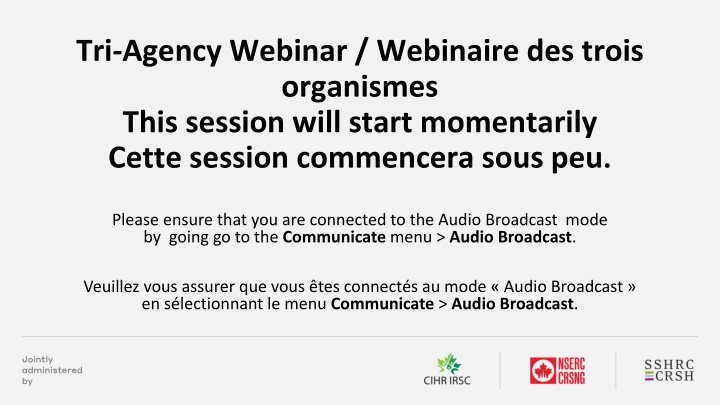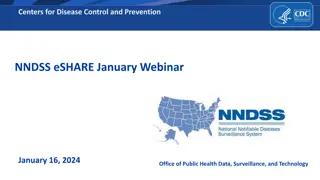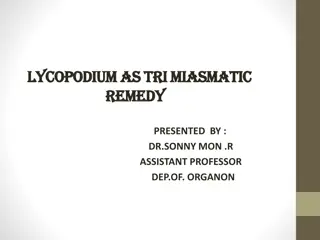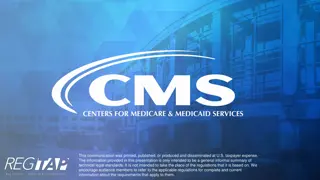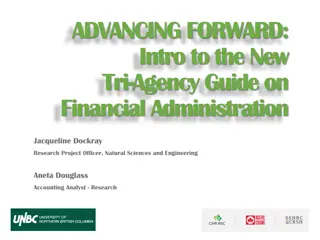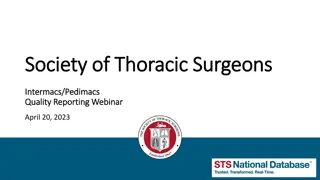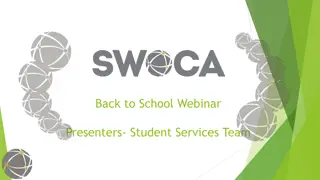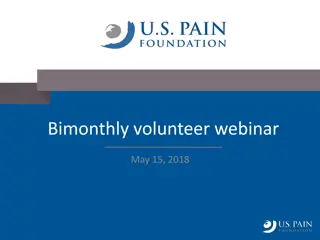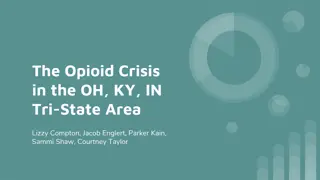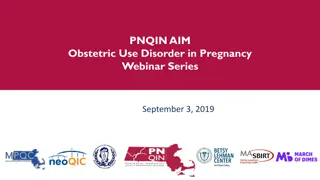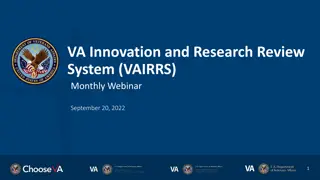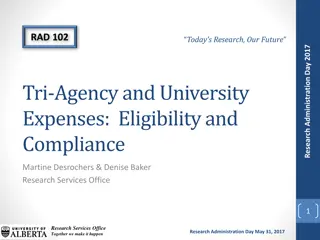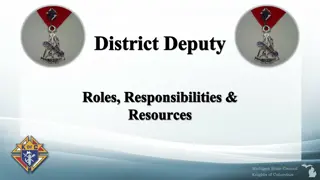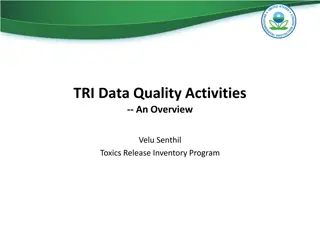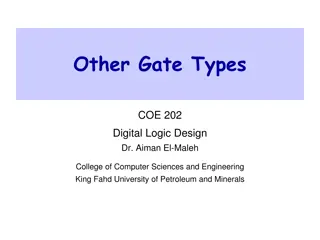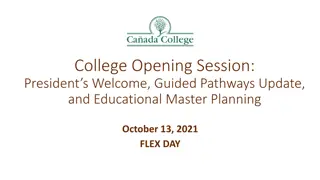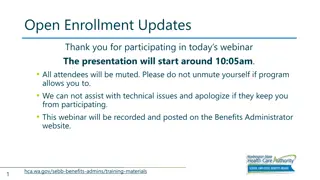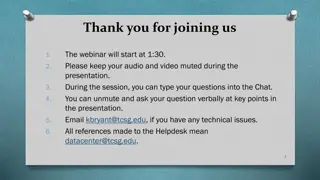Tri-Agency Webinar - Session and Guide Updates
This session introduces the Tri-Agency Renewal Initiative to streamline grant fund administration, featuring the new Tri-Agency Guide on Financial Administration. Learn about the objectives and focus areas of the initiative, aiming to enhance efficiency, reduce burden, and promote stakeholder collaboration in post-award administration.
Download Presentation

Please find below an Image/Link to download the presentation.
The content on the website is provided AS IS for your information and personal use only. It may not be sold, licensed, or shared on other websites without obtaining consent from the author.If you encounter any issues during the download, it is possible that the publisher has removed the file from their server.
You are allowed to download the files provided on this website for personal or commercial use, subject to the condition that they are used lawfully. All files are the property of their respective owners.
The content on the website is provided AS IS for your information and personal use only. It may not be sold, licensed, or shared on other websites without obtaining consent from the author.
E N D
Presentation Transcript
Tri-Agency Webinar / Webinaire des trois organismes This session will start momentarily Cette session commencera sous peu. Please ensure that you are connected to the Audio Broadcast mode by going go to the Communicate menu > Audio Broadcast. Veuillez vous assurer que vous tes connect s au mode Audio Broadcast en s lectionnant le menu Communicate > Audio Broadcast.
New Tri-Agency Guide on Financial Administration Nouveau Guide d'administration financi re des trois organismes subventionnaires
Tri-Agency Renewal Initiative: Background In 2017, CIHR, NSERC and SSHRC launched a renewal initiative to streamline and simplify the administration and use of grant funds through updates to the Tri-Agency Guide on Financial Administration (TAGFA). Purpose of the renewal: Increase trust in the grant recipients and administering institutions; Support harmonization efforts within the three Agencies, as highlighted in Canada s Fundamental Science Review Report, 2017; Apply a partnership approach with its stakeholders (Institutions, Research Administrators, Researchers) in the renewal of the various stages of post-award administration. This work is in response to feedback received from stakeholders regarding the inefficiencies and unnecessary burden imposed by the Tri-Agency Guide on Financial Administration (TAGFA) policies and guidelines.
Tri-Agency Renewal Initiative: Objectives Move to a more client-centric, flexible approach for the administration and use of grant funds; Renew the Tri-Agency partnership approach to financial monitoring activities with the administering institutions; and, Reduce burden and increase effectiveness of post-award administration (grant recipients & administering institutions).
About the Guide: Objectives Streamline and simplify the administration and use of grant funds Promote efficiencies and reduce administrative burden Clarify accountability of stakeholders Achieve a balance between compliance and flexibility Maximize the use of existing institutional policies, processes and controls
Use of Grant Funds: Principles Grant expenditures must: Contribute towards the direct costs of the research/activities for which the funds were awarded, and the benefits should be directly attributable to the grant; Not normally be provided by the administering institution to their research personnel; Be effective and economical; Not result in personal gain for any member of the grant team. The 4 principles apply to all types of expenditures.
Use of Grant Funds: Directives In addition to the 4 principles, 5 directives (mandatory requirements) have been established to provide a framework for administering institutions and grant recipients to exercise sound judgment and due diligence in their decision-making process concerning the use of Agency grant funds: Employment and Compensation Expenses; Goods and Services Expenditures; Travel and Travel-Related Subsistence Expenditures; Hospitality Expenditures; Gifts, Honoraria, Incentives.
Use of Grant Funds: Equity, Diversity and Inclusion The three Agencies commitment to equity, diversity and inclusion (EDI) is captured in the Tri-Agency Statement on EDI and the Tri-Agency EDI Action Plan. The Administering Institution is responsible for recognizing the importance of EDI in its policies and practices as stated in the Agreement on the Administration of Agency Grants and Awards by Research Institutions. The Agencies will continue to collaborate with external stakeholders, and defer to the relevant administering institution s policies and practices, to ensure that appropriate considerations are applied to support EDI in Tri-Agency grant funding (April 2020).
What Does This Mean For Me? Researchers can continue with their existing grants. Administering institutions (with the exception of pilot administering institutions) must continue to use the 2017 TAFAG until the principle-based guide (TAGFA) takes effect on April 1, 2020. This transition period (October 2019-April 2020) allows administering institutions time to review and update their policies and procedures, as needed.
Observations from PILOT administering institutions
TAGFA Pilot Project: Background A partnership model implemented in November/December 2018 between the three Agencies, 12 pilot administering institutions, grant recipients, and other key stakeholders, including the Canadian Association of University Business Officers (CAUBO) and Canadian Association of Research Administrators (CARA). Goal: To achieve and maintain effective engagement for the renewal of post-award administration policies and procedures. Objectives: Validate principles of the Guide; Develop tools to assess and support institutional readiness; Ensure the reduction in administrative burden for institutions and agencies; Increase harmonization of Tri-Agency advice/interpretation; Address concerns of non-pilot institutions related to implementation challenges.
TAGFA Pilot Project: Status Update The Guide has been revised based on feedback from the pilot administering institutions. The final draft has been shared with all administering institutions, for distribution to the research community (October 2019). The TAGFA is available on the NSERC website: https://www.nserc-crsng.gc.ca/InterAgency- Interorganismes/TAFA-AFTO/index_eng.asp
University of British Columbia First university to test the new Guide. The gap analysis made it possible to bring UBC's expenditure guide into line with the 4 principles. Establishment of a rapid response team composed of a few key individuals to deal with cases where there is a significant gap between the policy and the expenditure request for project implementation. Observations: Reduced back and forth for verification of expenditures between financial and research services: one audit is now sufficient. Reduced delays in processing transactions.
McMaster University Transition to a risk-based sample audit and judgment on the relative value of the expenditure: Definition of the relative importance of expenditures; Verification of expenditures above certain predetermined thresholds; and, Verification by stratum below these thresholds. Operations carried out by the accounts receivable department, simplifying the task of decentralized research departments. Observation: Saving time and money for the Institution.
York University Inclusion of a factor of material importance for the assessment of the conformity and eligibility of research activities. Audit effort focused on high-risk and high-value activities. Sampling audit for hiring expenses and weekly time sheets, focusing on large amounts and performing random audits. Threshold setting for invoices for goods and services and quarterly post-processing sampling.
Universit Laval Research Financial Management Framework already well established, simplifying the transition to the new Guide. Issues raised regarding the interpretation of the principles of "personal benefit" and efficiency , as well as the appropriateness of certain expenses in the case of travel and accommodation expenses. Observation: Decrease in the complexity of managing expenses related to research activities.
Gap Analysis: Results Established a working group to: identify gaps between the new and old guide and institutional policies or procedures; review common issues, situations and expenditure categories to determine how to address them; undertake to update policies and procedures where necessary. Approximate time required for gap analysis: 3 to 4 months on average. Results of the CAUBO survey will assist in performing the gap analysis. Institutional policies may exist, but may need to be clarified. Potential problem: As normative requirements have been eliminated, problems could arise in the absence of institutional policies.
Changes Since Implementation: Results Reduced the administrative burden: Less rigorous monitoring of office supplies. Travel: Justification/link of the conference with the travel/itinerary details is no longer necessary. Research funding officers are the arbiters - the ultimate decision-makers. More consultation between members of the research funding team. In some cases, continued consideration of all travel claims. 100% of journal entries still examined as supporting documents.
Lessons Learned 1. Inform and mobilize senior executives. 2. Find a champion. 3. Take the time necessary to identify gaps in current policies. 4. Have a good communication plan. 5. Conduct training and information sessions. 6. Consultation with pilot institutions.
Agency Commitments A change management and communication strategy has been developed to support this commitment and inform internal and external stakeholders. Planned/ongoing activities include : Updates to a web page dedicated to the project Webinars E-mails to targeted groups Attending conferences (e.g. CARA, ADARUQ, CAUBO) The three agencies are committed to keeping institutions and grant recipients informed of the progress and impacts of this initiative.
Resources and Learning Tools Beginning fall 2019, tools have been put in place to assess and support institutional readiness: Frequently Asked Questions Roles and Responsibilities Additional supporting material and learning tools will also be available to help stakeholders through the implementation of the TAGFA in April 2020: TAGFA course package Virtual Guidance Tool Policy Gap Analysis (CAUBO) Best practices (CAUBO) Readiness checklist
Virtual Guidance Tool Will provide decision support to grant holders and administering institutions related to the eligibility of expenses and use of grant funds, based on the principles and directives outlined in the Guide. Key features: Web-based Accessible online via the Resources section of the TAGFA website. Users will consult this quick tool to seek guidance on areas of interest not explicitly covered in the Guide. Interactive decision tree structure Will guide users through a series of key questions pertaining to various scenarios related to the eligibility of expenses and use of grant funds. Users will be provided with answers to key financial questions and practices, based on their decision-making process.
TAGFA Course Will be delivered by the administering institutions to allow stakeholders to accurately and effectively acquire and transfer knowledge related to the TAGFA (e.g. roles and responsibilities, financial matters, etc.). Customizable documentation will give institutions and trainers the flexibility to meet the unique learning needs of their communities. Package will include: PowerPoint presentation With accompanying notes to aid in the delivery of in-person training. Course delivery manual Will provide guidance on and estimates of the duration of activities, links to supporting resources, and engagement strategies for effective learning delivery. To support the trainers of the administering institutions, designated staff from the three agencies will offer remote Train-the-Trainer courses to assist them in delivering the TAGFA course.
Next Steps CAUBO materials: Best Practices Gap Analysis Implementation of TAGFA to all administering institutions (April 2020).
Contacts For general enquiries about the Renewal Initiative and the transition to the new Guide (TAGFA) including the Use of Grant Funds contact: All 3 Agencies CIHR Contact Center: support-soutien@cihr-irsc.gc.ca Until April 2020, all enquiries related to the Use of Grant Funds (2017 TAFAG) must be sent to: CIHR - support-soutien@cihr-irsc.gc.ca NSERC - grantsadministration@nserc-crsng.gc.ca SSHRC - grantsadministration@sshrc-crsh.gc.ca During the transition period and beyond, all grant amendment requests (TAGFA and 2017 TAFAG) must be sent to: CIHR - support-soutien@cihr-irsc.gc.ca NSERC - grantsadministration@nserc-crsng.gc.ca SSHRC - grantsadministration@sshrc-crsh.gc.ca
Question and Answer Session We invite you to join the discussion. Please address All Participants in the Chat feature.
